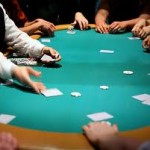 Making the transition from informal home games in your
friend’s basement or the online games played from the
comfort of your room to the strange new world of casino poker
might seem intimidating, but if you follow the advice in this
article, you’ll avoid embarrassing yourself.
Making the transition from informal home games in your
friend’s basement or the online games played from the
comfort of your room to the strange new world of casino poker
might seem intimidating, but if you follow the advice in this
article, you’ll avoid embarrassing yourself.
Preparation
Make sure to bring several full buy-ins if you plan on playing for at least a few hours. Using an ATM card can get you more money, and credit cards are often accepted at the cashier’s cage, but sometimes there are large fees. Besides, it’s much easier to keep track of your spending if you bring cash in the first place. One hundred dollar bills (or the largest denomination paper currency in your country) are a good choice. Some poker rooms allow you to play these large bills directly in a game without converting them to chips, which means you can replenish your stack without hassling the dealer or slowing down the game.
On your way into the casino keep an eye out for any “VIP Club” or “Frequent Player” booths. Go to one of these to get a free card that will earn you comps (points that can be redeemed for prizes, food or free-play) for any gambling done in that casino. Not all casinos have this, and some allow you to sign up in the poker room, but it can’t hurt to get one at the first booth you see.
Joining a Game
The standard poker room has a board in the front of the room that is manned by an employee called the the “brush.” Do not head directly to a table with an open seat – that seat might be reserved for someone else. Talk to the brush first and ask him what games are available. If you have a specific game you want to play in, you may request to be placed on a waiting list for that table. The brush will also be able to handle other questions about the rules of the poker room and the location of specific tables.
The procedure for buying chips varies from casino to casino. Some casinos rely entirely on chip runners, who are easily identifiable by their aprons which hold cash and chips. If you see these guys, it’s fine to just take your seat and wait for one to come find you. The chip runner will be expecting a tip for his services!
If you don’t see any chip runners, you should look for an area called the cage or the cashier. Get in line here and buy your chips before going to your table. Tell the cage worker what game and stakes you are playing and she will help you choose an appropriate chip denomination. Buying chips at the table is sometimes an option, but will slow the game down and will limit the ability of the dealer to make change, so avoid this if possible.
Live Poker Table Etiquette
Rule number one of live poker is pay attention. People get unhappy when you don’t notice it’s your turn. Pay attention to how you peek at your cards and how you throw them into the muck, to avoid exposing a card.
There are a number of rules about your chips that must be observed. Always keep your largest denomination chips in the front of your stack so other players can see them. Don’t move your chips forward unless you intend to bet, if they cross the betting line drawn on the table they are required to go in. Even if you retract them before you cross the line, this is an unethical move known as an angle shoot.
Verbal actions are binding, so don’t say something like “call and raise” as this will be ruled as a call only. Likewise, make a physical bet in one smooth action or else it will be determined a string bet, which will result in only the first set of chips you pushed across the betting line being allowed into play.
Strategy Tips
Teach yourself to estimate pot size fast. You aren’t allowed to touch the pot to count the chips, nor ask the dealer for a count of the pot size (you are allowed to request that the dealer count another player’s stack). Even in hands that you are not involved in, you should count the chips as they go into the pot to train yourself to count quickly.
Unless you’ve been playing a lot of webcam poker, you probably aren’t too good at reading opponents’ facial expressions. A good rule of thumb for low stakes games is that strong means weak and weak means strong. If someone makes a large bet and is aggressively staring you down, he probably has a bluff. However, expect to see a lot less bluffing in live poker games than in comparable online poker games. Poker players in real life are averse to embarrassing themselves, as well as the fact that many live games are populated with retirees who are looking to drink and socialize instead of play exciting poker.
Make sure to be patient if you want to win money. Games are fairly slow-paced, but there are frequently lively characters at the casino whose entertainment value will compensate for the slow dealing and tight play.
With this knowledge you might even be able to pass yourself off as a regular player. There are many other general poker customs that this article hasn’t covered, as well as many that are local to a specific region or casino, but as long as you are polite and aren’t afraid to ask questions, you will pick them up very quickly. Good luck!
